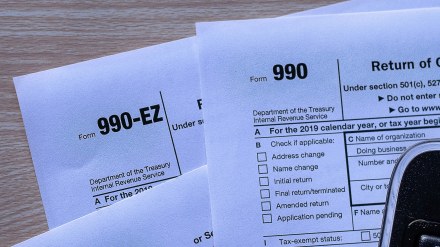A nonprofit organization’s legal challenge to the Form 990 exemption enjoyed by churches was dismissed on January 10, 2020, on technical grounds by the US District Court for the District of Columbia.
The outcome means churches remain exempt from filing the forms annually, which is widely considered to be a time-consuming, costly, and intrusive process for the nonprofits required to do it. But those behind the challenge say they will be back again with another legal challenge once they resolve the technical problems leading to the latest outcome.
NonBelief Relief’s exempt status revoked
NonBelief Relief Inc. was incorporated in 2015 as “a humanitarian agency organization” under 501(c)(3) of the Tax Code by the executive board of the not-for-profit atheist organization Freedom From Religion Foundation (FFRF). NonBelief Relief followed all of the requirements expected of
501(c)(3) entities, “except for the filing of annual information returns [Form 990]” over a three-year period, according to the October 2018 complaint it filed against the Internal Revenue Service (IRS) after the IRS revoked its tax-exempt status.
Under Section 6033 of the Internal Revenue Code, most nonprofits and charities must file the forms, except for churches and their closely affiliated entities, which are exempted based on the First Amendment’s Free Exercise Clause.
NonBelief Relief argued the exemption for churches violates the First Amendment’s Establishment Clause as an unconstitutional preference for religion and sought a declaratory judgment from the court stating so.
Defending the exemption
The IRS, joined by the New Macedonia Baptist Church—a congregation that requested to intervene with the case in an effort to defend the exemption on Free Exercise grounds—filed a motion for the court to dismiss the lawsuit.
The court granted the motion on January 10, 2020, through a decision written by US District Judge Timothy Kelly. Judge Kelly, in part, found NonBelief Relief lacked standing, a technical requirement needed in order to pursue any lawsuit. To gain standing, the court noted, a party must show three things: (1) it suffered an injury; (2) what caused the injury; and (3) that appropriate relief for the injury can be awarded.
Based on the approaches taken by NonBelief Relief to bring the challenge, Judge Kelly said the organization could no longer demonstrate an injury, stating:
NonBelief Relief alleges that it suffered an injury when, as a 501(c)(3) tax-exempt organization, it was required to file a Form 990, while churches and other religious institutions were not. But assuming that is so, that injury is neither ongoing nor imminent, because NonBelief Relief is no longer a tax-exempt organization and has expressed no intent to reapply for that status. In fact, NonBelief Relief is not currently suffering any injury caused by the Commissioner’s alleged preferential treatment of churches and religious organizations; it is being treated the same as all other non-501(c)(3) organizations. Because it is not suffering from an ongoing or imminent injury, it does not have standing to obtain the declaratory and injunctive relief at issue.
Judge Kelly then indicated proper relief also was not available to NonBelief Relief, adding, “a declaration that the church exemption is unlawful and an injunction prohibiting the Commissioner from enforcing it will not redress NonBelief Relief’s alleged injury; in fact, it will not affect NonBelief Relief at all.”
FFRF previously challenged the Form 990 exemption in 2013. That effort ultimately failed a year later after a Wisconsin federal district court determined FFRF had never lost its tax-exempt status in relation to the Form 990 filing requirement and thus lacked the necessary standing to bring its complaint. FFRF’s subsequent move to form NonBelief Relief, and with it, NonBelief Relief’s failures to file Form 990s, was part of an overall attempt to resolve the standing issues raised from the 2014 outcome.
FFRF called the decision “a technical setback”
FFRF, a 501(c)(3) based in Madison, Wisconsin, said Friday’s decision represented “a technical setback,” but it “will be refiling its challenge” after “NonBelief Relief jumps through some legal hoops.”
Regarding those legal hoops, FFRF specifically highlighted concluding portions from Judge Kelly’s opinion, in which he said the
decision does not mean that the church exemption is immune from judicial review. . . . As the Commissioner points out, NonBelief Relief could pay any taxes it owed, claim a refund for the entire amount, and sue when the refund was denied, arguing that its 501(c)(3) status was unconstitutionally revoked. . . . NonBelief Relief may also respond to a notice of deficiency with a deficiency suit in Tax Court, where it may raise the same issues before paying any taxes owed.
FFRF has also challenged the housing allowance
In addition to the Form 990 exemption challenges, FFRF is also widely known for its repeated, albeit unsuccessful, constitutional challenges to the clergy housing allowance. Last March, the US Court of Appeals for the Seventh Circuit in Chicago rejected FFRF’s efforts to undo the housing allowance, stating the valuable tax provision “falls into the play between the joints of the Free Exercise Clause and the Establishment Clause: neither commanded by the former, nor proscribed by the latter.”
Several years prior to the decision, the Seventh Circuit dismissed a prior housing allowance challenge by FFRF, stating the organization lacked standing. But similar to Judge Kelly’s opinion on Friday, the Seventh Circuit at that time offered a general roadmap the organization could use to resolve the issue of standing and increase its chances of proceeding to a trial evaluating the merits. FFRF followed that roadmap in 2017, leading to the decision reached by the Seventh Circuit last March.





